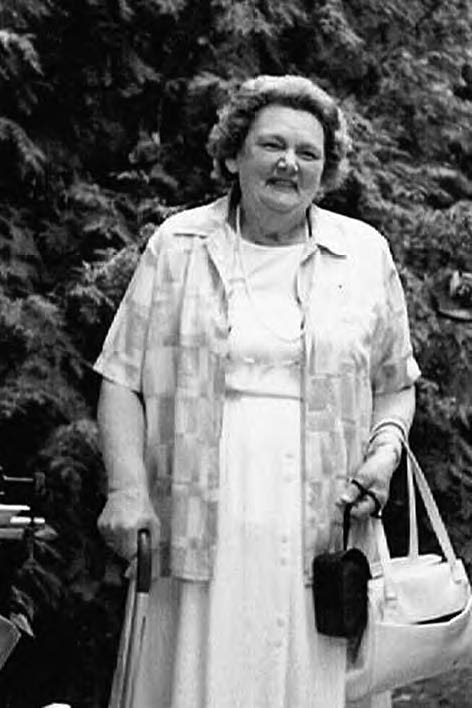Photo : Gaelies Renny
Jean Cameron was world famous for her pioneering work in developing the hospice care movement, having been instrumental in setting up the palliative care unit at Mon treal’s Royal Victoria Hospital, one of the first. She wrote a notable book, published in many languages. The National Film Board recorded a 1980 interview, which focused on her remarkable spirit for getting the most of life when crippled by disease. Jean, a long-time resident on Charles Street in Philipsburg, died during February. To her neighbours, she was a quiet, thoughtful, dignified lady who often had too many cats around her house. Everyone knew she was seriously ill and continuously incapacitated by cancer since before 1980. Day by day, for over thirty years, she was aware that death could be imminent. Many were the occasions when she suffered setbacks that were likely to be fatal. She survived.
Although incapacitated, Jean Cameron continued her work from home by telephone, providing comfort and peace to hundreds of patients facing death from disease. She had an extraordinary gift for connecting with people, rooted in her willingness to listen and comfort. Who else could be so effective as a skilled social worker who daily confronted the very possibility of her own death ?
The following is extracted from my eulogy to Jean Cameron at the recent memorial service in Saint Paul’s Church in Philipsburg.
How can we explain the deaths of the good and innocent ? How can we rationalize the injustice of chronic disease ? In his book Why Bad Things Happen to Good People, Rabbi Harold Kushner, whose young son succumbed to a rare disease, shared his struggle to understand undeserved suffering. He found no comfortable answers, thoughtfully discussing and rejecting classic answers, such as the idea that God has a hidden purpose that we cannot and need not understand, or that suffering is a test or a lesson.
Rabbi Kushner says he found peace of mind when he gave up the idea that everything that happens to us is caused by or is purposely allowed by God, or that everything happens for a reason. It is futile and foolish to expect the consequences of natural forces and human nature to conform to our notions of fairness. God, he says, doesn’t send us the problem. He gives us the strength to cope with the problem.
Jean, she had her adversities : chronic sickness, and the deaths of those closest to her. She did indeed cope and she was an inspiration to those who knew her and that circle numbered in the hundreds.
Jean was born in England and raised from infancy by grandparents, her mother having died. It was a rude shock to the young Jean when her father she did not know showed up with a new wife to take Jean off to live with them. Jean was distressingly uprooted.
Jean’s fiancé died in military service during the Second World War. She got on with life and met someone new, a doctor. He also died quite suddenly.
Jean needed a fresh start. She came to Montreal to visit her friend, Louise Macfarlane, and never left, making a career as a social worker on the wards at the Royal Vic. It was over thirty years ago when Jean detected a lump in her breast, which was diagnosed as cancer. It metastasized over time to her lungs, to her brain. She knew she was going to die.
It was miraculous that Jean lived 30 years as a cancer patient – and for very long, very sick and incapacitated.
I cannot speak of her professional career as a pioneer in palliative care – we were simply neighbours here in Philipsburg. I do know she was world-famous in her professional circle. She received a note of encouragement from Mother Theresa – one that instructed Jean that suffering was a gift from God. It took Jean much time and contemplation to gain an understanding of this apparently incredible declaration.
I once spoke to her of my excitement in having discovered Viktor Frankl’s book, Man’s Search for Meaning. Dr. Frankl was an Austrian psychoanalyst who survived the Nazi death camps and was notable for his pioneering work in psychiatry. Jean knew Viktor Frankl. Viktor Frankl might have boasted that he knew Jean Cameron. Dr. Frankl, on a visit to Montreal for professional meetings, asked the local organizers where he might find Jean : he didn’t want pass through Montreal without meeting this incredible woman.
She wrote a little gem of a book – A time to live, a time to die – that sold widely and in many translations.
The National Film Board filmed an interview of her in the 1980’s, which you can view on line.
If you do an Internet search on her name, you will find Jean Cameron’s name and words in catalogs of inspirational quotes, including this gem :
Honest Listening is one of the best medicines we can offer the dying and bereaved.
I was not among those who knew Jean best ; there are several among you here who were very much in her circle of intimates. Let me tell you what I appreciated about Jean.
Forgiving – bore no malice in her heart to scoundrels who had criminally cheated her or otherwise done her harm.
A friend to the underdog, the marginalized, and the isolated. Think of Fritz and Sam, two struggling alcoholics of the streets of Philipsburg. Jean would invite them on her porch for long friendly chats. If one of them was in prison for a spell, she would see to it that their pets would be cared for. There was a lonely lady in Philipsburg
who Jean called daily over many years, just to remind her that somebody cared about them. Lover of animals – her cats. Having caught a house mouse in a live trap, Jean was known to put food out for them after releasing them in her garden.
Keen gardener. In her final years, as a resident at a senior’s home, she would plant bulbs in locations outside the home when no one was looking.
Jean was dutiful, resilient, cheerful, hopeful, tolerant, tireless, habituated to hardship, and generous.
Jean was exceedingly generous – of her time, of her attention, and of her financial resources. Some of us might tell her that she was a bit of a soft touch when giving to people who saw her as an easy mark. I think she knew that to try to filter out the unworthy claimants from the deserving, she risked failing to provide for someone in real need. Her giving expected no reciprocity.
What she principally gave was herself and her undivided attention when you were in her presence.
Many go through life cultivating a circle of acquaintances of prestige to enhance their self-image. Jean sought out those who were ignored or shunned.
She cultivated the art of living in the moment. In an interview she declared :
I have time to appreciate things in a way I never did before. The first time I noticed this was quite soon after I was told I was going to die. It was early spring and there was the last unexpected snowfall of the season. I looked out the window at the snow and I felt this tremendous urge to rush outside. I stood in the snow and felt and saw the snowflakes drifting down on me and it was a beautiful experience. I was enjoying it in a way I never had before and somehow this registered in my mind. I can still remember that particular day very vividly. I think of it sometimes when things are going very wrong or something is distressing me. I remember that it was something special and you see, if I hadn’t had cancer, and I hadn’t known I was going to die, I wouldn’t have given that snowstorm a second glance.
Indeed, we may be seeing our way to understanding the enigmatic quote : Suffering is a gift from God.
Jean had learned to see, to listen, to be attentive, to be focused on the experience of each day. When I think of Jean I think of the words of Hymn 2 of the Anglican hymnbook :
Redeem thy misspent moments past And life this day as if thy last
Jean said of misfortune :
I don’t know why I have cancer. To me it is still, in a sense, unfair. But then again, as I always say, what is fair and what is unfair. We never say that all the joys and happiness we enjoy are unfair. It’s only the bad things and all our lives are a mixture of both.
Jean on her appreciation of nature :
I love being in the country. I feel very strongly there a part of all life and I look at nature …how I love the flowers and the trees and the animals and so on and I see both life and death there in very simple terms. And I see an enormous order in all this. You see that the leaves die in the autumn and then it’s a resurrection again in the spring and you see in nature nothing really dies. Nothing is wasted… It’s all transformed and I feel very strongly there’s a counterpart in the spiritual life too, that we see perhaps in our own religion that nothing is wasted and there is an order in everything.
When asked what are our responsibilities to a friend or relative who is dying :
The most important thing you can do for them is to let them know that you care. Many people are afraid to approach someone who is dying, because they are embarrassed. They don’t know what to say. It doesn’t matter what you say. It matters that you care. Once we know that someone cares for us, that is the most important thing of all.
How can you maintain hope ? Here are you with this terminal illness. You know you are going to die soon. Where is the hope ?
Hope does not die. Hope is something that changes from time to time through the different experiences that one has. At the beginning of the disease I did hope that it would not spread. But it did. Now hope has to be something different.
She was once asked why she planted flower bulbs by the hundreds in the autumn when the chances of seeing them flower were slim. She declared that as long as someone got to enjoy them, that would be satisfaction to her.
Viktor Frankl has written :
The experiences of camp life show that man does have a choice of action. There were enough examples, often of a heroic nature, which proved that apathy could be overcome, irritability suppressed. Man can preserve a vestige of spiritual freedom, of independence of mind, even in such terrible conditions of psychic and physical stress.
We who lived in concentration camps can remember the men who walked through the huts comforting others, giving away their last piece of bread. They may have been few in number, but they offer sufficient proof that everything can be taken from a man but one thing : the last of the human freedoms – to choose one’s attitude in any given set of circumstances, to choose one’s own way.
Jean Cameron chose her way, and is an example for all of us.






